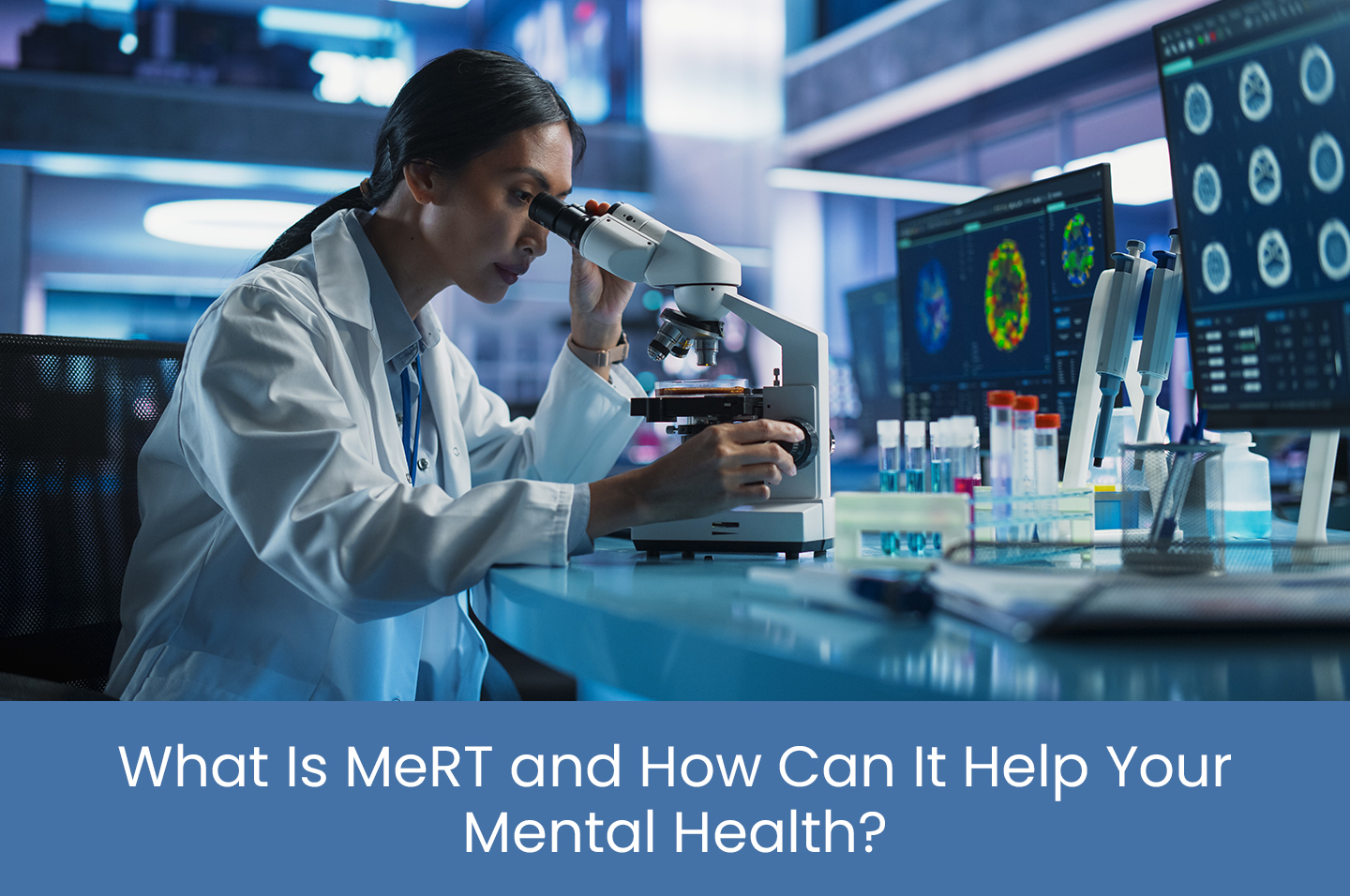
What Is MeRT and How Can It Help Your Mental Health?
- Home /
- What Is MeRT and How Can It Help Your Mental Health?

MeRT, which stands for Magnetic e-Resonance Therapy, is a highly effective, customized use of transcranial magnetic stimulation (TMS) that relies upon evidence-based and sophisticated diagnostics.
This non-invasive, drug-free, and painless treatment generates magnetic fields that allow clinicians to gently stimulate targeted areas of the brain to treat a wide range of psychiatric conditions.
In the past few decades, healthcare researchers have made remarkable advancements in the fields of brain imaging and neuromodulation, allowing clinical practitioners to develop and utilize highly personalized approaches to mental health therapy. MeRT protocols typically start with a quantitative electroencephalogram (qEEG).
The qEEG allows experts to map out any dysfunctional patterns in the brain’s electrical activity, which often show dysregulation in conditions such as autism spectrum disorder, depression, post-traumatic stress disorder, traumatic brain injuries, and concussions.
How does MeRT work?
This non-pharmaceutical procedure typically lasts between 30 and 35 minutes and takes place in a comfortable, relaxing setting. A coil is positioned against your scalp by your designated neuro-technician to deliver targeted magnetic pulses that stimulate brain activity in the designated region.
Unique to MeRT is its personalized approach. Unlike conventional rTMS (repetitive transcranial magnetic stimulation), which applies identical stimulation parameters for all patients, customized adjustments are made with MeRT that are based on individual brainwave patterns collected during the initial assessment.
The goal is simple: to deliver optimal, personalized care that aligns with your brain’s natural rhythm.
What can people with mental health conditions expect from MeRT therapy benefits?
MeRT therapy promotes neuroplasticity, which is the brain’s ability to reorganize and strengthen its connections. Over the course of treatment, many patients report substantial reductions in depressive and anxious symptoms, improvements in memory and attention, and better emotional regulation skills. Other commonly experienced MeRT therapy benefits include:
- Clearer thinking and improved memory
- Enhanced focus and sustained attention
- Reduced stress and overthinking
- Increased resilience to external pressures and stressors
- Better sleep patterns
- Fewer panic attacks and reduced trauma-related flashbacks
- Increased mental clarity and less brain fog
- Less chronic fatigue and better motivation
The billions of neurons in the brain form intricate networks responsible for our cognitions, behaviours, and moods. When these networks are disrupted, mental health symptoms may arise. By resetting irregular neural activity with personalized brain stimulation, MeRT supports the development of healthier patterns and promotes stability.
For many, these improvements occur gradually. Some patients describe experiencing a greater sense of mental clarity, while others notice reduced overthinking, intrusive thoughts, and spiraling. Not everyone sees immediate results, yet consistent treatment often leads to better and longer-lasting outcomes.
How does MeRT treat anxiety and mood disorders? Many patients report MeRT as smoothing out mood fluctuations and decreasing distressing symptoms. Reduced hypervigilance and nightmares are frequently reported by patients living with post-traumatic stress disorder (PTSD), making daily life more manageable.
Sleep cycles are also often regulated by MeRT so that those struggling with insomnia experience deeper and more restful nights. When sleep improves, cognition and emotional resilience improve, too. Could this be the missing link for you?
Who might benefit from MeRT?
Almost anyone can benefit from MeRT. This treatment has been extensively studied to assist individuals with a variety of mental health and neurological conditions, including those with:
- Mood disorders, including major depression and bipolar disorder
- Post-traumatic stress disorder (PTSD) and trauma-related stress
- Attention deficit hyperactivity disorder (ADHD) and cognitive difficulties
- Autism spectrum disorder (ASD)
- Insomnia and sleep disturbances
- Schizophrenia and psychosis-related disorders
- Cognitive decline and memory issues
- Substance use disorders and addiction
- Traumatic brain injuries and post-concussion syndrome
Traditional medications may come with an array of unwanted side effects. MeRT, however, works with the brain’s natural rhythms to support long-term mental health. This approach has been widely preferred by patients, as it eliminates the need for continuous pharmaceutical intervention.
How MeRT Compares to Other Brain Stimulation Therapies
Most brain stimulation therapies, including rTMS and deep brain stimulation (DBS), rely on standardized stimulation parameters. Not so with MeRT. Determined in real time is the optimal stimulation frequency, which ensures a personalized approach for each patient.
Unlike DBS, which also requires surgical implantation of an electrode, MeRT provides a safe, non-invasive alternative that adapts dynamically to changing brain activity.
In sum, MeRT doesn’t apply a one-size-fits-all treatment protocol, but instead, actively refines its approach to offer precision that is unmatched by traditional methods.
What happens when you start MeRT?
The process begins with an in-depth psychiatric history assessment, in addition to a quantitative electroencephalogram (qEEG) to pinpoint areas of irregular brainwave activity. The qEEG completed on each patient provides the map that guides each individually tailored treatment. The goal of therapy is to restore brain function and communication among your neurons.
Afterwards, patients will receive MeRT five times per week over a two-week cycle. Progress is then reviewed with another qEEG, and adjustments to the stimulation parameters are made if necessary. To achieve optimal success and durability from MeRT, six to eight weeks of treatment is advised.
You may be wondering what treatment feels like. Clients feel no pain, and a mild, tapping sensation may be felt as magnetic pulses interact with the brain. The majority of patients find the experience comfortable with no lingering effects.
What is the scientific evidence concerning MeRT?
Numerous studies have examined MeRT’s effectiveness in treating PTSD, major depressive disorder (MDD), ASD, and traumatic brain injuries. Research findings include the following:
- PTSD patients treated with qEEG-guided rTMS report significant symptom reduction, especially among those with combat-related trauma.
- Studies on ASD suggest MeRT can help correct abnormal brainwave activity, leading to improved cognition and behavioural functioning.
- Research on traumatic brain injuries indicates that MeRT can restore disrupted brainwave patterns, improving cognitive clarity and neurological stability.
- Clinical studies on major depressive disorder suggest that MeRT supports long-term emotional regulation and mood balance.
These findings reinforce MeRT as a promising therapy for a broad spectrum of mental health and neurological disorders. Could this be the psychiatric breakthrough that we’ve all been waiting for?
How safe is MeRT?
MeRT is an FDA-cleared, non-invasive therapy with a strong safety profile. Unlike other treatment options, it doesn’t require sedation, anesthesia, or medication. For those seeking a drug-free alternative, MeRT is a very appealing option.
Most clients tolerate MeRT well, but some report mild side effects, such as temporary headaches or slight fatigue. These effects usually resolve within a few hours, allowing individuals to continue daily activities without any disruption.
What’s the next step in exploring MeRT?
If you’re curious about how MeRT therapy benefits can improve your cognitive functioning, mood regulation, and overall mental health, the next step is a consultation. At Neurosync Brain Treatment Centre, your care begins with an in-depth qEEG analysis to detect dysregulated brainwave patterns and assess your suitability for MeRT.
Take control of your psychological well-being with this cutting-edge, non-invasive, therapy. Call 365-799-8438, email neurosyncbtc@outlook.com, or fill out our online form to begin your journey today.
Working Hours
Email: neurosyncbtc@outlook.com
Woodbridge. ON. L4L 1A6

